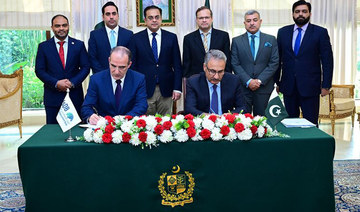ISLAMABAD: Hailing from Lyari in Pakistan’s Sindh province — an area once notorious for gang wars and crime — Nazeen Baluch says defying expectations by becoming Pakistan’s first Balochi woman director was never on her radar.
However, redefining the image of Lyari was.
Baluch, 26, is the second of four siblings, with both her parents working as educators. She completed her education in Media Studies and Advertising at the Iqra University before realizing “the need to tell unheard stories.”

Nazeen Baluch shares a shot of herself outside Iqra University where she studied Film and Media. 15th, August 2018. (Image via Nazeen Baluch Instagram)
“After a whole semester, I decided to change majors. During this time, the situation in Lyari was dangerous. I thought to myself, with the medium of film, I can use visuals to show the problems facing our society every day,” Baluch told Arab News.
She says she focused on Lyari because the area’s name itself invokes “lack of trust” with several sponsors and producers looking the other way, forcing people to make films on the topic on their own – something which Baluch strives to do.
After changing her major to Film and Television, Baluch finished her studies before settling down in Lyari, where she began shooting her first film – 2018’s “Lyari a Prison Without Walls.”
It tells the story of a family where a father and son are torn apart in different directions for wanting to live life on their own terms before their wife/mother’s diagnosis rocks their understanding of a family. The story is played out against the backdrop of a politically-unstable Lyari.
“The focus of creators from Lyari is to make films for the betterment of the society,” Baluch said, adding that, through her film, she sought “to tackle this horrible perception of us.”
“When stepping out, people would pass comments about our outfits. There is a gap between us and our fellow Pakistanis and I want to erase the gap. We know how nice the people of Lyari are such kind and gracious people,” she said.
Inspired by those very people, Baluch began writing to not just share stories of her beloved home but to also engage the youth from her area to choose the right path to success.
“How can we show the truth how the youth are being neglected and stray to the wrong path. It’s not their fault. My goal is to show my society’s problems and find solutions. This is my purpose,” she said, adding that the “solution” itself was not without its share of problems, especially in Lyari where working in a film or media profession is not deemed fit for women.
“When I started shooting in Lyari, where many of the locals are religious and have very little education, leaving the house became a problem, for my family as well, they never say it but I would feel guilty. Before marriage, I took a gap and forgot everything. I felt I was going away from my passion,” Baluch said, adding that it was support from her family that kept her going.
“People would look at me and make hurtful comments and it became extremely difficult for me until I began thinking I should leave filmmaking. But I motivated myself with the support of my husband and brothers who always said ‘Don’t stop Nazeen!’,” she said.
This was in 2017. Little did she know that a year later, she would be putting Lyari on the world map.
“If I tell you I’m a good filmmaker, well that is not even possible. I am still learning. But I plan to keep working on the issues in our society,” she said, before reiterating on the need to educate girls and women.
“I want to encourage others to allow their daughters to study no matter... You need to trust her. She will improve your life as well as hers... If we don’t give these girls the strength and encouragement how will they face their society? I want every Balochi woman to come forward.”














